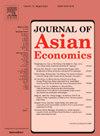中国的市场准入和教育不平等
IF 3.4
3区 经济学
Q1 ECONOMICS
引用次数: 0
摘要
本文研究了全球化在中国制度背景下对人力资本投资的影响。本文建立了一个纳入内生教育选择的一般均衡模型,表明全球化在促进整体人力资本形成的同时,也加剧了中国限制性户籍制度造成的城乡高校教育不平等。市场准入对这一差距的影响因地区而异。利用中国收入项目1995年和2002年的数据,我们发现市场准入每增加1 %,城乡高等教育差距就会增加1.2个百分点。研究结果表明,如果不解决与户口政策相关的土地使用问题,单靠户口改革并不能减少教育不平等。本文章由计算机程序翻译,如有差异,请以英文原文为准。
Market access and educational inequality in China
This paper investigates how globalization affects human capital investment within China's institutional context. We develop a general equilibrium model, incorporating endogenous education choices, to show that while globalization promotes overall human capital formation, it also exacerbates rural-urban college educational inequality due to China’s restrictive household registration (hukou) system. The impact of market access on this disparity varies across regions. Using China Income Project data from 1995 and 2002, we find that a 1 % increase in market access increases the rural-urban higher education gap by 1.2 percentage points. The findings suggest that hukou reform alone will not reduce educational inequality without addressing the land-use issues linked to hukou policies.
求助全文
通过发布文献求助,成功后即可免费获取论文全文。
去求助
来源期刊

Journal of Asian Economics
ECONOMICS-
CiteScore
4.70
自引率
9.40%
发文量
90
期刊介绍:
The Journal of Asian Economics provides a forum for publication of increasingly growing research in Asian economic studies and a unique forum for continental Asian economic studies with focus on (i) special studies in adaptive innovation paradigms in Asian economic regimes, (ii) studies relative to unique dimensions of Asian economic development paradigm, as they are investigated by researchers, (iii) comparative studies of development paradigms in other developing continents, Latin America and Africa, (iv) the emerging new pattern of comparative advantages between Asian countries and the United States and North America.
 求助内容:
求助内容: 应助结果提醒方式:
应助结果提醒方式:


